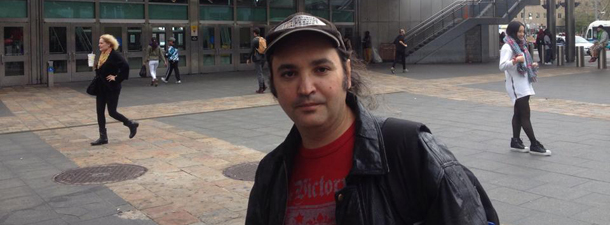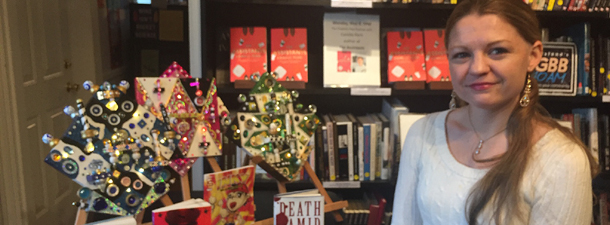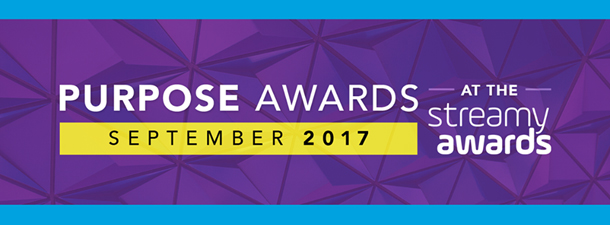Gameshows, Music, Acting and More: Interview with Entertainer and Translator Aleks Yakubson


Aleks Yakubson loves to play games–specifically, quizzes. The Staten Island, New-York based Aleks often plays host to an “amateur” version of a popular Russian quiz game which was adapted on NBC as “Million Dollar Mind Game” a few years back. Aleks started out as a player who eventually decided to use his love of the game as a platform to further his acting and entertaining skills.
“Million Dollar Mind Game” is performed at the Ripley-Grier studios in Manhattan, which also hosts the offices of the famed comedy troupe Upright Citizens Brigade–an organization for which Aleks was once an extra on their Comedy Central TV series. Aleks has been partaking in acting for more than twenty years and he won a Facebook-based short film festival in 2012. The film for which he won was titled “The Hunger Poem” which is a one-man monologue movie based on a translated tale by Arkady Averchenko, a great Russian satirist of the early 20th century. Aleks filmed the short movie with the help of his friend, Kyrill Dremlyukh, who has run his own “underground” film company for fifteen years. Aleks and Kyrill also collaborated on a somber film titled “The Child Within” which tackles the issue of modern day sex slavery.
By primary trade, Aleks is a translator who speaks Russian, English, Ukrainian and even some Spanish. After moving to New York City in 1993 when he was only eighteen, Aleks has since moved to Staten Island. He enjoys translating poems and songs of great writers including Gregory Corso, Emily Dickinson, and even rock-n-roll hits. In fact, Aleks is also a songwriter who pens tunes of his own, and records among other songs that essentially serve as a cultural bridge between the two sides of Atlantic, because they have significance for both Russian and American culture, and in one case also for Brazilian one.
Aleks is also interested in indie journalism, political activism, and blogging. He originally came from Harkiv, Ukraine, which is a big city located not far from the area of current war between Ukraine and pro-Russian separatists and their Russian backers. Hence, Aleks takes great interest in what goes on in the former USSR. Ultimately, through his work as a creative person and an entertainer, he would like to become a standard bearer for his community, a role model for people of Russian and Ukrainian descent who are living in America.
Meagan Meehan (MM) of Entertainment Vine: You are a game show host, so what made you get into that kind of work?
Aleks Yakubson (AY): Well, so far, it’s not really work. I’ve only done it a couple times over the course of several years. In this game, anyone can host on occasions if they want to. I had several reasons to try it: practicing my leadership and entertainment skills, which can come in handy at some points in life, especially that of an aspiring showbiz person, and just fun. Also, slight sense of power, especially over some of the people who are consistently better players than me!
MM: Can you tell us a bit about the game?
AY: It’s a quiz game started in mid-1970s on then-Soviet TV, which is a very Russian thing in that it takes something invented in the West, and takes it to a whole new level and form. Just like they say Russian literature added some new dimensions to what originally was borrowed from European culture, this game built on the trivia genre but gave it many unique features. The game is more about logically arriving to the correct answer, than knowing it, though of course being an erudite tremendously helps. It’s about quickness of thought and it creates a special atmosphere of an ‘elite intellectual club’ as opposed to more ‘democratic’ traditional quiz shows, where seemingly ‘simple’ folk can get a shot at fame and even fortune–yet at the same time, one of great innovations of this game is soliciting questions from regular TV viewers. In terms of the format of questions, I’d say the closest I remember on American TV was probably “Carmen San Diego”. There was also an attempt to ‘plant the seeds’ of the WWW game on US television ‘soil’, when ABC aired it for several weeks in 2011 as a filler for NBA. Sadly, it wasn’t continued, though it did garner much praise from critics and game show enthusiasts.
MM: You grew up in Ukraine and came to the United States when you were eighteen, so what were the biggest changes you had to get used to?
AY: Well, obviously language was one, as I kind of slacked in terms of picking it up PRIOR to coming here. I actually took Spanish in school, even though it was presumed we’d go to USA someday. Another one was probably the much faster and more pulsating rhythm of life here, something I’m still getting used to and probably will be getting used to until my last days, but then again, even in ‘city that never sleeps’ you can find some ‘sleepy hollows’ like Staten Island, where I have been living for eleven years now which is almost half of my US life.
MM: When you were growing up, what were some of the artistic influences they inspired you?
AY: Nice but hard question to answer, since there were so many! Of course, most of those were Soviet, mainly Russian language ones, members of the great Russian and adjacent acting schools, also musicians etc. Also, those that sifted through the thick fences of censorship, such as some French influences, especially in cinema and pop music. But perhaps one most worth mention is Vladimir Vysotsky, an actor, poet and folk singer considered by many the most influential Russian artist of 20th century. Extremely prolific and powerful in his delivery, he growled long before Lemmy Kilmeister and Kurt Cobain, and essentially invented a very curious singing style where he’d extend consonants instead of vowels. I can’t–sadly–say that I can growl like him, but the overall untamed sheer sincerity and forcefulness of his style is something that I try to borrow from, perhaps more in terms of inner content than outward delivery of my own artistic endeavors.
They say Vysotsky is unique in that everyone from a thug to an academician back in Russia considered him ‘his kind of artist and person’. Vysotsky made one or two trips to US in the 1970s, and to some American folk his name may ring a bell a little bit. Also, such Russian rock musicians as Boris Grebenshchikov, Andrey Makarevich and especially Dmitry Revyakin, the latter disappointing me a little bit lately, due to his political position. It’s always sad when you find yourself on opposite side of ‘barricade’ from those you hold dear.
Other than that, of course, it was people like Beatles, ABBA, but also some artists that probably wouldn’t come to mind as those most influential to a twelve to fifteen year old Soviet boy in the 1980s to the early 1990s, such as Cream, Jethro Tull etc. I credit my older brother and many of his friends with helping develop my artistic and in many ways, overall tastes and principles.
Also, when with perestroika the American content, in particular cinematic, started making its way to our lands, I was taken by films and acting of the cast of such diverse pieces as “Eastwick Witches,” “Back to the Future” and “The Never-Ending Story” just to name a few. The latter I honestly consider much better than the “Harry Potter” series!
MM: How did you get into acting and what kinds of roles are your favorites to play?
AY: My earliest attempts at acting were in school and summer camps, and generally I always wanted to try my hand at something artistic and to a point, if you will egocentric, lol. Then in 1997, I decided to seriously give it a shot and started going to auditions. On occasions, I’d get some work.
I’d say I like more than all to play a sort of mysterious stranger that is ultimately well meaning but a bit on a dark side, with some internal turmoil. I think the formula with relaxed and kind of humorous start eventually turning into an emotional outburst and culmination that I tried to use in my own “Hunger Poem” short film, is what suits me best. Interestingly, I kind of compare it to some of Kurt Cobain’s songs, and he is another of my all-time favorites and influences.
MM: You write music too, so did songwriting or acting come first and do you enjoy one most?
AY: I’d say it’s kind of changed over time. I probably liked acting more a decade and especially two ago, but now I’m enjoying ‘doing my own thing’ more, and music allows more of it. Though I must note that as someone who is sadly not that good at playing instruments, I am reliant on other people to pick up my ideas and carry them out in collaboration, so sometimes the end product, while invariably very good, is not quite what I conceived. Thus, I don’t know if it’s fully suitable to call me a composer, more like idea generator.
MM: You are a translator and you have translated music, poems, etc. Why do you think it’s so important to share creative works across multiple cultures?
AY: People and cultures have always interacted and integrated, even if at times we get tired of it and try to stave those processes off. If you take extant cultures of today, and by today, I mean the last four-thousand years really, you won’t find a single fully ‘homogeneous’ culture, they’re all products of mixing and hybridization. English language culture is a clear example of that, as it’s had great input from so many diverse sources, be it Germanic, Celtic, Romance (in several waves, first Ancient Roman, then French, then again French, in some ways also Spanish etc.), Greek, Hebrew, Arabic etc. If you take Shakespeare, perhaps the greatest playwright of all time, many of his works were inspired by Italian chronicles, depicting Italian cities, characters, and so on, as well as Danish, ancient Gaelic and what not. In our time, when the world in cultural, political, economic, informational senses has truly become ‘flat’, it’s especially important to interact artistically. Which, of course, doesn’t mean some less than reputable political entities and personalities should reap benefits from cultures of the country they happen to temporarily rule.
MM: You also blog, so do you see writing as an extension of your creativity?
AY: In a way yes, but perhaps the opposite is just as true. It’s more of a symbiosis, really, because all these activities of mine deal with similar issues, goals, etc. I want to try to comprehend the world, make it a better place, make it more comfortable for myself too. I’d be a liar if I denied I want to be rich, famous, influential and what not, and if I could simultaneously be of use to some good causes, then what can be better? So, I both try to reflect topics I cover in my blog articles, in my poetry or music, and also use quite a number of references learned from mu musical and other artistic parts of life, in my writing, as well as at times writing about artistic events or personalities, both living and gone, and in sort of reflection through broader social, political, historical and general life context.
MM: Where do you see yourself artistically ten years from now and what is forthcoming for you?
AY: Ten years from now I see myself performing at the central square of my city of Harkiv, actually the largest square in Europe, as a headliner at a show dedicated to the ‘city day’, which actually is a date of its liberation from Nazi occupation during World War II. Hopefully with loving wife and a few kids awaiting backstage and, by then, being the most famous son of that city. Meanwhile, I am on a constant lookout for opportunities to further my creative, social and other endeavors, and to get the word out about them.
* * * * *
To watch “The Hunger Poem” short film on YouTube, see here.
To learn more about “The Child Within,” visit its IMDb.
To hear Aleks’ music, visit his Soundcloud.


